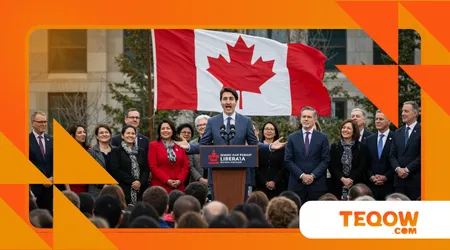Liberals Pledge Faster Recognition of Foreign Credentials for Healthcare and Skilled Trades

Liberals pledge faster recognition of foreign credentials, a bold promise igniting hope for immigrants in healthcare and skilled trades.
As Canada grapples with labor shortages, this policy could reshape the nation’s economic and social fabric.
Announced in April 2025, during a heated federal election campaign, the Liberal Party, led by Prime Minister Mark Carney, aims to streamline credential recognition processes.
This move addresses long-standing barriers for internationally trained professionals, particularly in critical sectors.
With the election looming on April 28, 2025, the pledge resonates with voters seeking economic resilience amid U.S. trade tensions.
Why does this matter? It’s a lifeline for thousands of skilled immigrants and a potential boost for Canada’s overstretched industries.
This article dives into the Liberal’s commitment, exploring its implications, challenges, and transformative potential.
We’ll unpack the policy’s context, its impact on healthcare and trades, and the hurdles ahead.
Through real-world examples, data, and sharp analysis, we’ll reveal why this pledge could redefine Canada’s workforce or falter under systemic inertia.
Let’s explore how this promise could bridge dreams and reality for immigrants and Canada alike.
The Context: Why Credential Recognition Matters in 2025
Canada’s labor market is at a crossroads. Aging demographics and post-pandemic recovery strain healthcare and construction.
Immigrants, often overqualified, face credential roadblocks. Liberals pledge faster recognition of foreign credentials to unlock this talent pool.
In 2023, over 25% of immigrants with foreign credentials worked in jobs below their skill level, per Statistics Canada. This wastes potential and fuels frustration.
The policy emerges amid U.S. tariff threats, which demand a robust Canadian economy. Streamlining credentials aligns with the Liberals’ $130 billion spending plan, emphasizing workforce integration.
For immigrants like Aisha, a Nigerian nurse stuck in retail, this could mean practicing her profession. Yet, bureaucratic delays and inconsistent provincial standards loom large.
Elections amplify the stakes. The Liberals’ focus on immigrants counters Conservative tax-cut rhetoric. Can this pledge deliver, or is it campaign optics?
The answer hinges on execution and political will.

Healthcare: A Sector in Crisis Awaits Relief
Hospitals are stretched thin. Doctor shortages and long wait times plague Canadians. Liberals pledge faster recognition of foreign credentials to bolster healthcare staffing.
Internationally trained doctors and nurses, like Sanjay, an Indian physician driving Uber, could fill gaps.
In 2024, Canada faced a shortfall of 15,000 nurses, per the Canadian Nurses Association.
The Liberal plan promises a national framework for credential assessment within 12 months. This cuts wait times from years to months.
Provinces like Ontario, with pilot programs, show success 70% of foreign-trained nurses integrated faster in 2024. But scaling this nationally demands coordination.
Skeptics question funding and provincial buy-in. Without clear timelines, Sanjay’s hope fades.
The Liberals must balance speed with quality to avoid compromising standards. This pledge could save lives if it’s more than a promise.
Also read: Conservatives Propose Stricter Background Checks for International Students
Imagine a hospital as a sinking ship. Immigrants are lifeboats, ready but tethered by red tape. Liberals pledge faster recognition of foreign credentials to cut those ropes.
Success depends on federal-provincial harmony. Ontario’s model is a beacon, but Quebec’s resistance to centralized standards could derail progress.
Skilled Trades: Building Canada’s Future
Construction booms, but skilled workers are scarce. Carpenters, electricians, and welders are in demand.
Liberals pledge faster recognition of foreign credentials to address this. Immigrants like Maria, a Brazilian electrician, face re-certification hurdles despite decades of experience.
In 2024, Canada needed 80,000 more tradespeople, per BuildForce Canada.
The Liberals propose a centralized trades credential portal by 2026. This standardizes assessments, reducing Maria’s wait from two years to six months.
British Columbia’s 2023 fast-track program saw 60% of foreign electricians certified within a year. Scaling this could fuel infrastructure projects.
Yet, unions worry about oversaturation. Provinces guard their regulatory turf. The Liberals must navigate these tensions to deliver.
Maria’s skills could power Canada’s growth if bureaucracy doesn’t dim her spark.
Picture Canada’s infrastructure as a half-built bridge. Foreign tradespeople are the missing beams. Liberals pledge faster recognition of foreign credentials to slot them in.
But local resistance and uneven standards threaten collapse. A unified portal is promising, but only if provinces align.
Challenges: Bureaucracy, Politics, and Trust

Bold promises meet stubborn realities. Liberals pledge faster recognition of foreign credentials, but bureaucracy is a formidable foe.
Credential assessments vary by province, creating a patchwork system. Ontario’s process differs from Alberta’s, confusing applicants.
Harmonizing this requires federal-provincial cooperation historically contentious.
Political risks abound. The Conservatives, trailing by five points in April 2025 polls, call the pledge costly and vague. Voter trust hinges on results.
If Aisha waits years for her nursing license, skepticism grows. Funding $2 billion over four years must be spent wisely.
Public perception is another hurdle. Some fear lowered standards. The Liberals must communicate rigor to maintain confidence. Can they deliver before the 2029 election? Only time will tell.
Distrust festers when promises linger unfulfilled. Immigrants deserve clarity, not campaign slogans. Liberals pledge faster recognition of foreign credentials, but execution is everything.
Transparent timelines and provincial buy-in are non-negotiable. Without them, this risks becoming another broken vow.
Table: Credential Recognition Timelines by Province (2024)
| Province | Healthcare (Months) | Skilled Trades (Months) |
|---|---|---|
| Ontario | 12-18 | 10-14 |
| British Columbia | 10-15 | 8-12 |
| Alberta | 18-24 | 12-18 |
| Quebec | 20-30 | 15-20 |
The Path Forward: A Roadmap for Success
What does success look like? A system where Sanjay practices medicine within a year. Liberals pledge faster recognition of foreign credentials as a first step.
A national task force, launched in May 2025, could unify standards. Pilot programs in Manitoba show 80% of foreign doctors certified in 10 months.
Funding must target technology AI-driven credential mapping could speed assessments. Public-private partnerships, like Ontario’s 2024 collaboration with colleges, cut costs.
Immigrants need support too language training and bridging programs boost integration. Aisha’s journey depends on these details.
Engagement is key. Why should Canadians care?
Because faster integration strengthens communities and economies. The Liberals must sell this vision while delivering results. Aisha and Sanjay are waiting.
Canada’s future hinges on talent. A centralized, transparent system could unlock it. Liberals pledge faster recognition of foreign credentials, but action must follow words.
Regular progress reports and stakeholder input will build trust. The clock is ticking.
Economic and Social Impacts: Beyond the Ballot
This pledge isn’t just policy it’s a social contract. Integrating skilled immigrants boosts GDP. A 2023 study estimated a $10 billion economic gain from faster credential recognition.
Communities thrive when Aisha and Maria contribute their expertise. Diversity enriches Canada’s cultural mosaic.
Socially, it’s a win for inclusion. Immigrants gain dignity, not dead-end jobs. Yet, backlash risks persist. Some fear job competition.
The Liberals must counter this with data immigrants create jobs, not steal them. Clear communication prevents division.
Economically, healthcare and trades drive growth. Faster credentialing fills gaps, easing strain on hospitals and construction.
But without follow-through, these benefits evaporate. The Liberals’ legacy depends on delivery.
Inclusion isn’t just moral it’s pragmatic. Skilled immigrants fuel innovation. Liberals pledge faster recognition of foreign credentials to harness this.
Public campaigns showcasing success stories like Sanjay’s could shift narratives. Canada’s strength lies in unity, not fear.
Frequently Asked Questions
Q: How soon will the Liberal’s credential recognition plan take effect?
A: The Liberals aim for a national framework by mid-2026, with pilot programs starting in 2025.
Q: Will this lower professional standards?
A: No. The plan emphasizes rigorous, standardized assessments to maintain quality while speeding processes.
Q: Who benefits most from this policy?
A: Internationally trained healthcare workers and tradespeople, especially in high-demand provinces like Ontario and British Columbia.
Q: How will provinces cooperate?
A: A federal task force will align standards, though Quebec’s autonomy may pose challenges.
Canada stands at a pivotal moment. The Liberals’ pledge to fast-track foreign credentials could transform lives and industries.
But promises aren’t enough execution is everything. Will this policy bridge the gap between immigrant dreams and Canadian needs?
